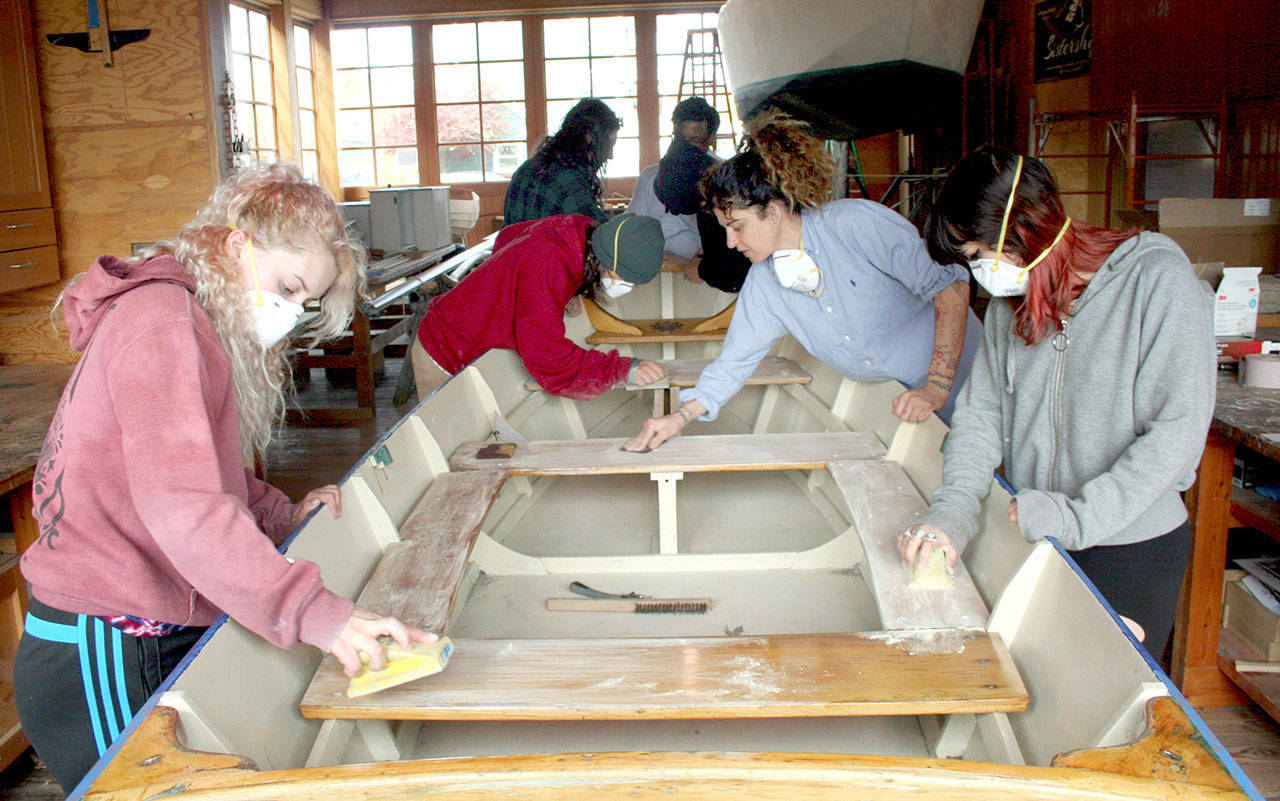PORT TOWNSEND — Students are learning more than how to sand and varnish a wooden boat at the Northwest Maritime Center.
Through the Real World Readiness program, a partnership between the maritime center and the Jefferson County Juvenile and Family Court system, a small group of teenagers from 15 to 18 are engaging in communication and teamwork that can translate to job skills.
“It gives kids who got in trouble with the law a chance to better themselves and learn a skill set that can lead to employment,” said Rigel Carlson, one of nine students enrolled in this spring’s 10-week program.
Still relatively new, the maritime center kicked off a pilot project last summer and had a second class last fall.
Darrell Thomas, an education employment specialist who also works as a probation officer, said Jefferson is one of five counties in the state to use a model established in 2015 by the state Institute for Public Policy.
“It’s an evidence-based program that has been proven to reduce recidivism,” Thomas said.
Funding initially came from the state for the pilot program. Last fall, the Better Living Through Giving Circle provided a grant for $11,000 through the Jefferson County Community Foundation, said Robin Mills, the program director at the maritime center.
This spring, the Glaser Foundation of Seattle provided a $10,000 grant, Mills said.
“Because we have a full year now, we can get a better idea of what is working and what is not working,” Mills said.
The class meets weekly on Wednesdays and covers many soft skills such as resume building, financial literacy, communication and teamwork, Thomas said. It also provides hand-on skills with the boats in the boat shop and out on the water.
“A lot of kids don’t fit into the normal high school system,” Thomas said. “This helps train them for most employers and even exposes them to maritime-type work.”
The students earn minimum wage and one Career and Technical Education school credit. Last fall, when the class met on Saturdays, they became certified in CPR and First Aid, and they also earned their state boaters card.
The students, most of whom come from Port Townsend or Chimacum high schools, are identified through the court system and an assessment, Thomas said. They may enter the court system due to family structure, drugs and alcohol or theft, he said.
“Sometimes kids go mostly under the radar for a long time,” Thomas said. “A lot of their needs aren’t being met.”
The pay, provided by the grant, can help motivate the students to attend, but many students also come away with additional employment opportunities.
Three students secured employment with local businesses following the class last summer, Thomas said. Two got jobs last fall, and one went to Job Corps. The jobs ranged from working at a car wash, roofing, restaurants and a franchise tire shop.
The class also has partnered with WorkSource and the Pathways to Success programs, Thomas said.
“My time with the kids comes to an end at some point,” he said.
Mills said she meets with the three class instructors, including Thomas, to discuss the students on a case-by-case basis and find out what fits for them.
Carlson knew he wanted a hands-on job because his grandfather was a carpenter, but he didn’t know about the Real World Readiness program until he got a chance to get involved.
“I think it’s a good opportunity for kids to turn their stuff around and give them an idea of what they might like to do,” he said.
Pink Moloitis knew a little bit about boats before the class, but she didn’t realize how much she would enjoy different aspects of them.
Earlier this week, she sailed on a research vessel to Discovery Bay, where she helped to set shrimp pots one day, and sort and count them on a return trip.
“This is a big opportunity, and it can lead you to other opportunities,” Moloitis said.
________
Jefferson County Managing Editor Brian McLean can be reached at 360-385-2335, ext. 6, or at bmclean@peninsuladailynews.com.

